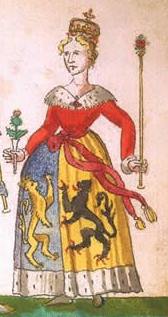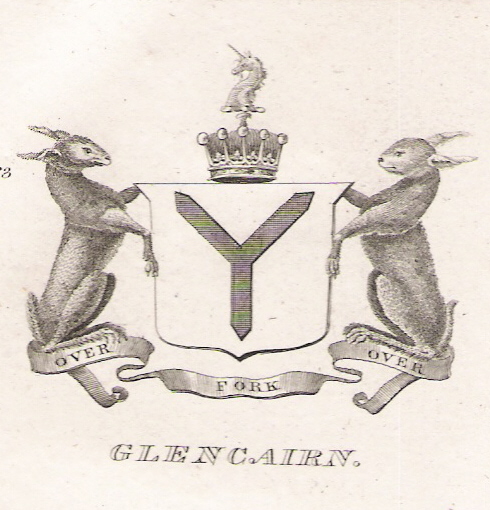|
Alexander Cunningham, 1st Earl Of Glencairn
Alexander Cuninghame, 1st Earl of Glencairn, 1st Lord Kilmaurs (1426 – 11 June 1488) was a Scottish nobleman. He became Lord of Kilmaurs on 8 February 1464 and Earl of Glencairn on 28 May 1488 Alexander of Kilmaurs succeeded his father before 20 March 1451, when he granted to the Friars-Preachers of Glasgow a yearly sum of four and a half merks from the lands of Finlaystone for masses on behalf of his grandfather and grandmother. Alexander was of the Court of King James II, while on his expedition to the south country against James, 9th and last Earl of Douglas. On 18 July 1452, he went into the tent of Lord Chancellor of Scotland (Crichton), where he resigned into the King's hands his lands in Ayr including Kilmaurs, as well as the sheriffdom of Ayr, and the lands of Kilmarnock in Stirling, Finlaystone in Renfrew, Glencairn in Dumfries, and Hilton in Berwick. After a pause, King James II regranted and gave the said lands to Alexander and his heirs. In 1458 Alexander acted ... [...More Info...] [...Related Items...] OR: [Wikipedia] [Google] [Baidu] |
Friars-Preachers
The Order of Preachers ( la, Ordo Praedicatorum) abbreviated OP, also known as the Dominicans, is a Catholic mendicant order of Pontifical Right for men founded in Toulouse, France, by the Spanish priest, saint and mystic Dominic of Caleruega. It was approved by Pope Honorius III via the papal bull '' Religiosam vitam'' on 22 December 1216. Members of the order, who are referred to as ''Dominicans'', generally carry the letters ''OP'' after their names, standing for ''Ordinis Praedicatorum'', meaning ''of the Order of Preachers''. Membership in the order includes friars, nuns, active sisters, and lay or secular Dominicans (formerly known as tertiaries). More recently there has been a growing number of associates of the religious sisters who are unrelated to the tertiaries. Founded to preach the Gospel and to oppose heresy, the teaching activity of the order and its scholastic organisation placed the Preachers in the forefront of the intellectual life of the Middle Ag ... [...More Info...] [...Related Items...] OR: [Wikipedia] [Google] [Baidu] |
Merks
The merk is a long-obsolete Scottish silver coin. Originally the same word as a money mark of silver, the merk was in circulation at the end of the 16th century and in the 17th century. It was originally valued at 13 shillings 4 pence (exactly of a pound Scots, or about one shilling sterling), later raised to 14''s.'' Scots. In addition to the merks, coins issued include the four merk worth 56s or £2/16/- (£2.8); the half merk (or noble), 6 shillings and 8 pence or 80d; the quarter merk, 3s and 4d or 40d; the eighth-thistle merk, worth 20d. The first issue weighed and was 50% silver and 50% base metals,. thus it contained of pure silver. "Markland", or "Merkland", was used to describe an amount of land in Scottish deeds and legal papers. It was based upon a common valuation of the land. During the "Lang Siege" of Edinburgh Castle in 1572, the last phase of the Marian civil war, the goldsmith James Cockie minted half merks in the castle, while the supporters of James V ... [...More Info...] [...Related Items...] OR: [Wikipedia] [Google] [Baidu] |
James II Of Scotland
James II (16 October 1430 – 3 August 1460) was King of Scots from 1437 until his death in 1460. The eldest surviving son of James I of Scotland, he succeeded to the Scottish throne at the age of six, following the assassination of his father. The first Scottish monarch not to be crowned at Scone, James II's coronation took place at Holyrood Abbey in March 1437. After a reign characterised by struggles to maintain control of his kingdom, he was killed by an exploding cannon at Roxburgh Castle in 1460. Life James was born in Holyrood Abbey.Grants "Old and New Edinburgh" He was the son of King James I and Joan Beaufort. By his first birthday, his only brother, his older twin, Alexander, had died, thus leaving James as heir apparent with the title Duke of Rothesay. On 21 February 1437, James I was assassinated, and the six-year-old James immediately succeeded him as James II. He was crowned in Holyrood Abbey by Abbot Patrick on 23 March 1437. On 3 July 1449, the eighteen-y ... [...More Info...] [...Related Items...] OR: [Wikipedia] [Google] [Baidu] |
Earl Of Douglas
This page is concerned with the holders of the forfeit title Earl of Douglas and the preceding feudal barons of Douglas, South Lanarkshire. The title was created in the Peerage of Scotland in 1358 for William Douglas, 1st Earl of Douglas, son of Sir Archibald Douglas, Guardian of Scotland. The Earldom was forfeited by James Douglas, 9th Earl of Douglas, in 1455. Origins Mythic beginnings The Earls of Douglas, chiefs of Clan Douglas, and their successors claimed descent from Sholto Douglas, a mythical figure dated by Godscroft to 767 AD. However, it is more likely that they were descendants of Flemish immigrants to Scotland, during the reign of David I. Through the marriage of William the Hardy, grandfather of the 1st Earl, to Eleanor de Lovaine, the Earls of Douglas could trace their ancestry to the Landgraves of Brabant. In the story of Sholto Douglas, his son William Douglas is a commander of forces sent by the mythical Scottish king Achaius (Eochaid?), to the court ... [...More Info...] [...Related Items...] OR: [Wikipedia] [Google] [Baidu] |
Bailie
A bailie or baillie is a civic officer in the local government of Scotland. The position arose in the burghs, where bailies formerly held a post similar to that of an alderman or magistrate (see bailiff). Baillies appointed the high constables in Edinburgh, Leith and Perth Perth is the list of Australian capital cities, capital and largest city of the Australian states and territories of Australia, state of Western Australia. It is the list of cities in Australia by population, fourth most populous city in Aust .... Modern bailies exist in Scottish local councils, with the position being a courtesy title and appointees often requested to provide support to the lord provost or Provost (civil), provost - the ceremonial and civic head of the council - in their various engagements. History The name derives from Old French and used to be synonymous with provost (civil), provost, with several officials holding this role often at the appointment of the Church. The jurisdiction ... [...More Info...] [...Related Items...] OR: [Wikipedia] [Google] [Baidu] |
Earl Of Glencairn
Earl of Glencairn was a title in the Peerage of Scotland. It was created in 1488 for Alexander Cunningham, 1st Lord Kilmaurs (created 1450). The name was taken from the parish of Glencairn, Dumfries and Galloway, Glencairn in Dumfriesshire so named for the Cairn Waters which run through it. On the death of the fifteenth earl in 1796, there existing no original Letters Patent of the creation nor a given remainder in the various confirmations in title of previous earls the title became dormant The earldom was claimed by Sir Adam Fergusson, 3rd Baronet, Sir Adam Fergusson of Kilkerran, Bt., as heir of line of Alexander 10th, Earl of Glencairn and was opposed by Sir Walter Montgomery Cunningham of Corshill, Bt., as presumed heir male along with Lady Henriet Don, sister of the last earl, and wife of Sir Alexander Don of Newton Don, Roxburghshire. The House of Lords Committee of Privileges on 14 July 1797, chaired by the Lord Chancellor (Alexander Wedderburn, 1st Earl of Rosslyn, Lord ... [...More Info...] [...Related Items...] OR: [Wikipedia] [Google] [Baidu] |
Robert Cunningham, 2nd Earl Of Glencairn
The name Robert is an ancient Germanic given name, from Proto-Germanic "fame" and "bright" (''Hrōþiberhtaz''). Compare Old Dutch ''Robrecht'' and Old High German ''Hrodebert'' (a compound of '' Hruod'' ( non, Hróðr) "fame, glory, honour, praise, renown" and ''berht'' "bright, light, shining"). It is the second most frequently used given name of ancient Germanic origin. It is also in use as a surname. Another commonly used form of the name is Rupert. After becoming widely used in Continental Europe it entered England in its Old French form ''Robert'', where an Old English cognate form (''Hrēodbēorht'', ''Hrodberht'', ''Hrēodbēorð'', ''Hrœdbœrð'', ''Hrœdberð'', ''Hrōðberχtŕ'') had existed before the Norman Conquest. The feminine version is Roberta. The Italian, Portuguese, and Spanish form is Roberto. Robert is also a common name in many Germanic languages, including English, German, Dutch, Norwegian, Swedish, Scots, Danish, and Icelandic. It can be use ... [...More Info...] [...Related Items...] OR: [Wikipedia] [Google] [Baidu] |
1488 Deaths
__NOTOC__ Year 1488 ( MCDLXXXVIII) was a leap year starting on Tuesday of the Julian calendar. Events January–December * January 8 – The Royal Netherlands Navy is formed, by the decree of Maximillian of Austria. * February 3 – Bartolomeu Dias of Portugal lands in Mossel Bay, after rounding the Cape of Good Hope at the tip of Africa, becoming the first known European to travel this far south, and entering the Indian Ocean. * February 28 – Choe Bu (1454–1504), the Korean Commissioner of Registers for the island of Cheju, shipwrecks on the south east coast of China in Taizhou, Zhejiang. * June 11 – Battle of Sauchieburn: James IV of Scotland becomes king after his father is killed in action. * July 12 – Joseon Dynasty official Choe Bu returned to Korea after months of shipwrecked travel in China. * July 28 – Battle of Saint-Aubin-du-Cormier: Troops loyal to King Charles VIII of France defeat rebel forces, led by the Dukes ... [...More Info...] [...Related Items...] OR: [Wikipedia] [Google] [Baidu] |
Scottish Pre-union Military Personnel Killed In Action
Scottish usually refers to something of, from, or related to Scotland, including: *Scottish Gaelic, a Celtic Goidelic language of the Indo-European language family native to Scotland *Scottish English *Scottish national identity, the Scottish identity and common culture *Scottish people, a nation and ethnic group native to Scotland *Scots language, a West Germanic language spoken in lowland Scotland *Symphony No. 3 (Mendelssohn), a symphony by Felix Mendelssohn known as ''the Scottish'' See also *Scotch (other) *Scotland (other) *Scots (other) *Scottian (other) *Schottische The schottische is a partnered country dance that apparently originated in Bohemia. It was popular in Victorian era ballrooms as a part of the Bohemian folk-dance craze and left its traces in folk music of countries such as Argentina ("chotis"Span ... * {{disambiguation Language and nationality disambiguation pages ca:Escocès ... [...More Info...] [...Related Items...] OR: [Wikipedia] [Google] [Baidu] |
1426 Births
Fourteen or 14 may refer to: * 14 (number), the natural number following 13 and preceding 15 * one of the years 14 BC, AD 14, 1914, 2014 Music * 14th (band), a British electronic music duo * ''14'' (David Garrett album), 2013 *''14'', an unreleased album by Charli XCX * "14" (song), 2007, from ''Courage'' by Paula Cole Other uses * ''Fourteen'' (film), a 2019 American film directed by Dan Sallitt * ''Fourteen'' (play), a 1919 play by Alice Gerstenberg * ''Fourteen'' (manga), a 1990 manga series by Kazuo Umezu * ''14'' (novel), a 2013 science fiction novel by Peter Clines * ''The 14'', a 1973 British drama film directed by David Hemmings * Fourteen, West Virginia, United States, an unincorporated community * Lot Fourteen, redevelopment site in Adelaide, South Australia, previously occupied by the Royal Adelaide Hospital * "The Fourteen", a nickname for NASA Astronaut Group 3 * Fourteen Words, a phrase used by white supremacists and Nazis See also * 1/4 (other) * F ... [...More Info...] [...Related Items...] OR: [Wikipedia] [Google] [Baidu] |


